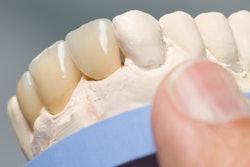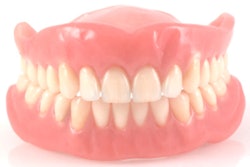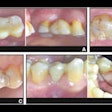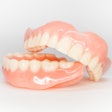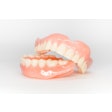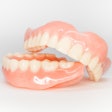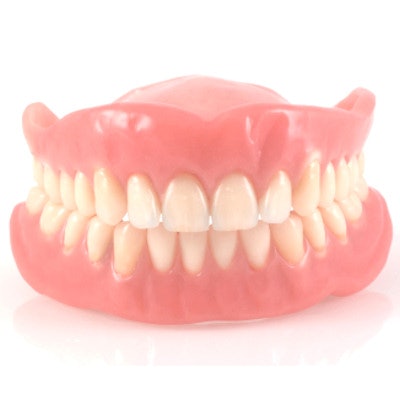
The type of denture your patients have appears to have a long-term impact on how satisfied they are with their oral health-related quality of life. A new study found that patients with implant-retained overdentures reported a significantly better quality of life than those with conventional dentures.
A team of Spanish researchers studied edentulous patients with either implant-retained or conventional dentures for more than 20 years. They published their findings on the psychological, physical, and social effects of those dentures in Clinical Implant Dentistry and Related Research (December 14, 2017).
"The major finding from this study is that a worse quality of life was shown in the group of patients who had conventional dentures in relation with the group with implant-retained overdentures, who experienced significant improvements," wrote the authors, led by Mariano Sánchez-Siles, DDS, PhD, a dentist and oral surgeon in Murica, Spain.
Significant improvements in quality of life
The effects of edentulism can be long-lasting and far-reaching for patients' oral and physical health, as well as their psychological and social well-being. Despite these consequences, dentistry is just starting to quantify how its tools affect patients' quality of life.
“Worse quality of life was shown in the group of patients who had conventional dentures.”
"In dentistry, the development of tools designed to measure the quality of life is relatively recent," the authors wrote. "Therefore, this has become of great interest to the patient's perspective and the benefits of various treatment options."
The researchers set out to compare quality-of-life outcomes for more costly implant-retained dentures with less expensive, conventional dentures. To find out, they recruited 80 edentulous participants with an average age of 84. Half of the participants had conventional complete dentures, while the other half had overdentures retained on two or four dental implants and cast bars.
To measure quality of life, the researchers used the 14-question Oral Health Impact Profile (OHIP), which gauges how participants think their oral health affects their quality of life. The scale ranges from 0 to 56, with higher scores corresponding to worse quality of life.
| Quality of life by denture type | |||
| OHIP category | Conventional denture | Implant-retained overdenture | Statistically significant? |
| Functional limitation | 5.20 | 2.20 | Yes |
| Physical pain | 5.00 | 2.20 | Yes |
| Psychological discomfort | 3.60 | 2.23 | Yes |
| Physical disability | 4.80 | 2.15 | Yes |
| Psychological disability | 3.00 | 2.28 | Yes |
| Social disability | 2.40 | 2.15 | No |
| Handicap | 3.00 | 2.15 | Yes |
| Total scores | 27.00 | 15.35 | Yes |
After studying the participants for more than 20 years, the researchers found that patients with implant-retained overdentures reported a significantly better quality of life than patients with conventional dentures. The difference was also significant in every quality-of-life category except for social disability.
"The results of this study demonstrated that [oral health-related quality of life] improved following delivery of conventional dentures and of two implant-retained overdentures and that the treatment effect was stable over time," the authors wrote. "However, the magnitude of the treatment effect was significantly larger for the implant group."
The researchers also found that the group with implant-retained overdentures reported satisfaction at a much higher rate than those with conventional dentures. Furthermore, the only people dissatisfied with their oral health-related quality of life had conventional dentures.
"One of the most important facts is that only in the group with implant-supported [overdentures] we can find people extremely satisfied and the rest satisfied," the authors wrote. "Whereas in the group with conventional dentures, we find only satisfied, a little satisfied, no change, and dissatisfied."
Need for more quality-of-life studies
While this study appears to show that implant-retained overdentures have a significant and long-lasting effect on patients' quality of life compared with conventional dentures, there were a number of shortcomings. First, the Oral Health Impact Profile does not capture positive quality-of-life traits, so some of the benefits of each denture type may be missing. The researchers also did not include a group of people who were not edentulous to serve as a reference point, nor did they include patients with severe periodontitis, severe osteoporosis, bone metabolic diseases, or uncontrolled type 1 diabetes. Finally, the majority of the implant-retained dentures were on the mandible, so the results may not be applicable to maxillary overdentures.
However, based on their study findings, "long-term implant-retained overdentures provide significant increases in patient satisfaction and, therefore, a better quality of life in a long-term use compared with those patients with conventional dentures," the authors concluded.
They also called for future studies with a larger maxillary overdentures sample to evaluate the effect of the treatment on oral health-related quality of life, noting that their study emphasizes the need for more research that investigates the role dentistry plays in overall and oral quality of life for patients.




